
How to Find a Weight Loss Coach: The Definitive Guide
It's no secret that losing weight is hard, and without someone to help guide, support, and motivate you along the way, it can feel downright impossible. So, it makes sense that you'd want help from a weight loss coach.
But, how do you find a coach? How do you know if you even need one? What questions should you ask before committing to a service? And what if your coach doesn't work out for some reason?
In this article, we'll cover all of these questions and more!
Are you looking for a specific answer about choosing a weight loss coach? Click on a question and go straight to the good stuff:
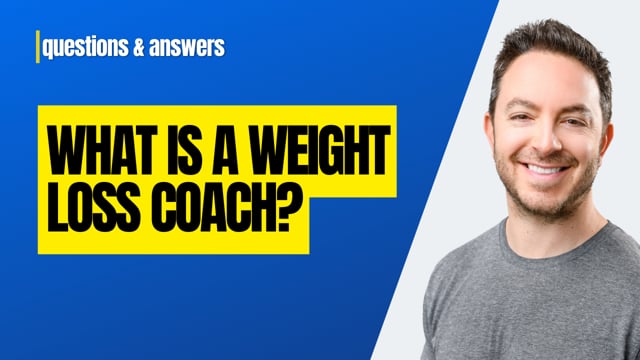
What is a Weight Loss Coach?
A weight loss coach is a professional who helps individuals achieve their weight loss goals. Through coaching, support, and accountability, they help people change their habits in ways that lead to long-term weight loss.
It's true that losing weight isn't easy, especially if you're going at it alone. But that's where a coach can help!
They will help you achieve your goals by:
Designing your diet and exercise plan,
Giving you the tools needed to make healthy choices each day,
Helping you stick to your plan by providing motivation and accountability, and
Working with you to anticipate and overcome the inevitable obstacles that will come up along the way.
Many people think that to lose weight, all they have to do is eat right and exercise. And they’re not entirely wrong. Diet and exercise are important, but the most important thing you can do to reach your goal is to consistently stick to your plan. Unfortunately, that's easier said than done.
So, to be successful, you need a plan that is reasonable, realistic, and doable, as well as someone to help you deal with all the problems that get in the way of consistency—and that's what a weight loss coach does.
If you've ever wondered why it's so hard to stick to a diet, this article will tell you why and show you how to make it easy.
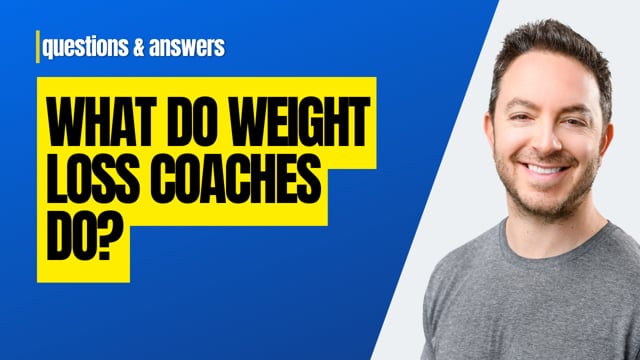
What Do Weight Loss Coaches Do?
Weight loss coaches help people make lasting changes that will improve their health and overall well-being. They do this by helping people set goals, giving them the tools they need to reach those goals, and holding them accountable for the changes they want to make.
While a weight loss coach may help people come up with an eating and exercise plan, that's just the beginning. They will help you figure out what's really going on with your relationship with food and how that might be stopping you from reaching your goals.
Why is this important?
Because it's not enough to just tell people what they should do to lose weight—anyone can do that. Besides, most people already know what to do!
A coach will help you understand why you want to lose weight and, more importantly, why you might want to sabotage your progress.
They will help you look more closely at the things that have been holding you back, find any self-sabotaging habits that are getting in the way, and help you break down those barriers one by one.
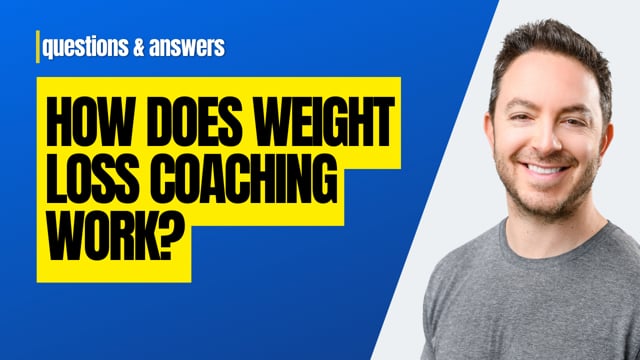
How Does Weight Loss Coaching Work?
The weight loss coaching process has four main steps: building a nutrition and exercise plan, following through on the agreed-upon changes, being accountable for those changes, and working through the problems that will inevitably come up.
If you want to know how weight loss coaching actually works. It's time to get down to business.
Weight loss coaching is a process made up of four main steps:
Step 1. Build a nutrition and exercise plan.
In this step, the coach learns about you and your goals. They'll find out what you like and don't like and which changes you're willing to make and which you aren't. The coach's job is to make sure that you have a plan that is reasonable, realistic, and doable.
The goal here is to have a plan that gets you excited—because you know it's one you can stick to!
Step 2. Follow through on the agreed-upon plan.
This means that you are making the changes to your diet and exercise routine. This could mean that you are trying to eat more fruits and vegetables or that you are going for a walk around the block after work. In short, this is where the rubber meets the road and where you're putting the plan into action.
Tip: You might feel like you need to change everything about your life at once. But this is a mistake. If you try to change everything, you'll just feel overwhelmed and want to give up on your goals before you even start. The best way to make a big change is to make small changes.
Step 3. Tell your coach how the changes went.
Did you make the changes you agreed to? Did you have a hard time sticking to the plan? Did you find that the changes were too difficult or too easy for you?
This is where you help your coach better understand what works for you and what doesn't so they can adjust your plan. The important part here is to be open and honest with your coach. If you made the changes, that's great! If you didn't, share the reasons why. This is the essence of accountability, and it's the key ingredient to success.
Step 4. Work together to solve problems.
In this step, you'll work with your coach to get ready for challenges, and make adjustments to your plan. When you're trying to lose weight, things don't always go as planned, but that's okay, they don't have to. That's why you have a coach! Your coach will help you figure out how to deal with problems, make changes, and build a plan for long-term success.
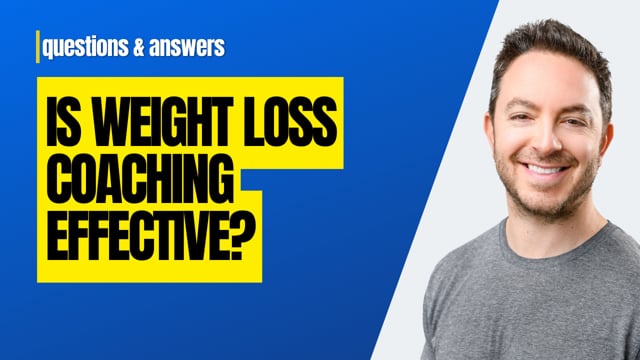
Is Weight Loss Coaching Effective?
Weight loss coaches are skilled in helping their clients overcome the obstacles to losing weight, such as keeping track of their diet and exercise, managing negative emotions, surviving holidays and vacations without regaining the weight they lost, and dealing with social pressures.
When you are trying to lose weight, it can feel like you have to deal with a never-ending list of problems.
Think about all the times you have a late-night junk food craving or how your diet went back to square one after a vacation. It's hard to figure out how to solve these kinds of problems by yourself.
But this is where having a weight loss coach really pays off. They know what it's like to have a late night craving and how easy it is to slip back into old habits when you're not prepared.
Coaches help keep you on track when times get tough. And that could mean helping you find ways to deal with boredom so you don't go looking for snacks or helping you come up with strategies so vacations don't totally derail your diet.
Remember that there is more to losing weight than eating and exercising. It's also about dealing with all the little things that make it hard to stay on track. Having a coach can help you avoid common mistakes that keep most people from losing weight.
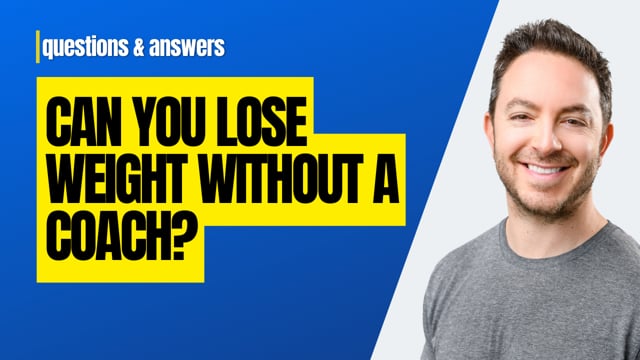
Can You Lose Weight Without a Coach?
To lose weight without a coach, you will need to develop a solid understanding of nutrition and exercise, find an eating plan that works for your lifestyle and preferences, and be motivated enough to make changes that are sustainable over time.
I've been asked, "Can I lose weight without a coach?" a lot! And the answer is yes, but there are some things you need to know.
First, you need to know that doing it alone won't be easy. You're going to have days when you don't feel like working out or eating healthy, and you'll have days when you feel like giving up. So just know that going in, and know that it's okay—it's normal and part of the process.
Second, be sure to set realistic goals for yourself. If you set your expectations too high, not only do you risk burning out trying to reach them, but you also set yourself up to be disappointed when you don't reach them right away.
Third, you will need to develop the skill of holding yourself accountable. This means you need to be honest with yourself about your progress (or lack thereof) and be willing to make changes if you're not getting results.
Finally, you will need to learn how to conquer emotional hunger. This means learning how to separate your feelings from your actions. It can be tempting to turn to food when you are angry, sad, bored, or frustrated. But, if you know how your feelings affect the way you eat, you can make better choices about what to eat, when to eat, and how to deal with those feelings in other ways.
So, can you lose weight without a coach? Yes. A lot of people have.
Coaches aren't for everyone, and some would argue they're not necessary at all. But, if you're determined to lose weight, keep it off, and change the way you think about food, you might want to look into getting one.
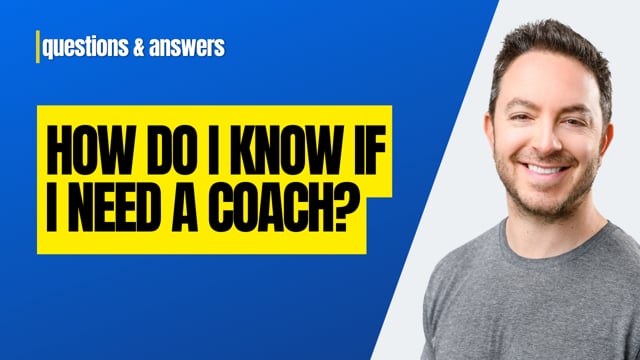
How Do I Know if I Need a Weight Loss Coach?
If you are struggling to lose weight and need someone to hold you accountable, a weight loss coach can be an incredibly helpful tool as you work towards your health goals.
If you're reading this, chances are that you're strongly considering working with a weight-loss coach. But what if we could help make your decision easier?
We put together a list of signs to help you decide if a weight-loss coach is right for you.
The Top 5 Signs You Should Hire a Weight Loss Coach
If you know what to do but can't make yourself do it.
If you're tired of making promises to yourself that you don't keep.
If it feels like you've tried "everything under the sun."
If you feel stuck in a rut and need help getting out of it.
If you have trouble sticking to your plans and need someone to keep you on track.
If you read any of these five signs and thought, "Yes, that's me!" you should consider hiring a weight loss coach.
If you want to find out more about what a weight loss coach can do for you, read how 1:1 weight-loss coaching from MyBodyTutor will work for you.
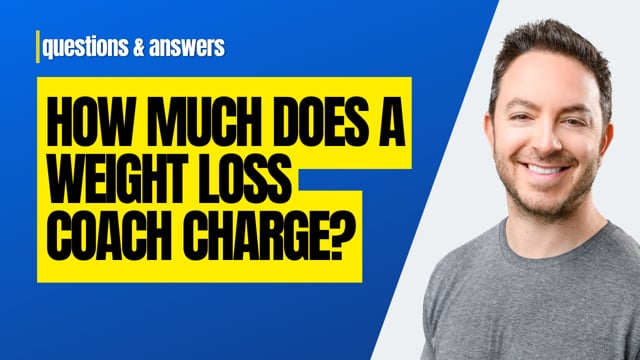
How Much Does a Weight Loss Coach Charge?
Survey results show that a weight-loss coach can charge anywhere from $30 to more than $200 per hour. The cost is mainly based on where the coaching takes place, how much experience the coach has, and what they specialize in.
If you're in the market for a weight loss coach, I'm sure you have a lot of questions. And "How much does it cost?" is the most common one.
The answer to this question gets complicated because there are so many variables to consider, like the coach, the type of program and how long it lasts, the number of sessions, and whether they do group or one-on-one coaching.
But out of all the things to consider, there are two factors that I believe are essential.
If the coach you're thinking about hiring meets these two criteria, then you're probably in good hands. But if they don't, you might want to look elsewhere.
Does the coach offer a money-back guarantee? This is an important question because a good coach should be sure of their program and be able to give you your money back if it doesn't work for you. Otherwise, you're taking all the risk. The best weight loss coaches will offer a money-back guarantee and confidently stand behind their program.
Does the coach offer proactive or reactive coaching? Proactive coaching is when your coach reaches out with advice and support without you having to ask. Reactive coaching is when you have to ask them for help before you hear from them. But, if the coach is always waiting on you, that's not really "coaching," is it?
At MyBodyTutor, our coaching program is designed to meet both of these criteria. We don't just sit back and wait for clients to ask us questions. Instead, we proactively reach out to help our clients, sometimes before they even know they need it!
We also have a guarantee that other programs are simply too afraid to offer. Give us 30 days to show you that our proactive coaching is what you've been missing all along. And if it doesn't work for you, we'll refund your money and pay for you to start a program that better fits your needs.
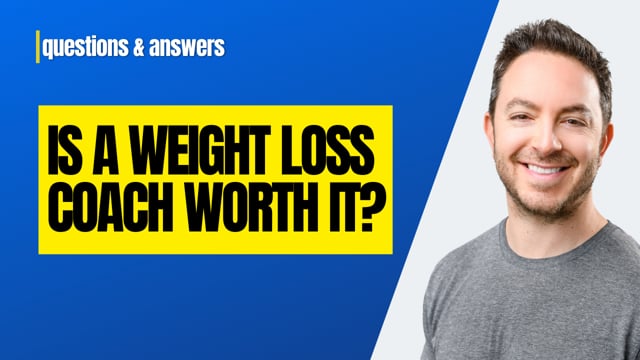
Is a Weight Loss Coach Worth It?
The majority of people who attempt to lose weight are not successful. However, studies show that people are 65% more likely to reach their goals if they have coaching, accountability, and support than if they don't.
The question of whether or not a weight loss coach is worth it is a good one to ask. And it is, if you have the right coach and if they're able to offer the support that you need.
But spending time and money on the wrong coach can be a waste of both, so the important question is: how do you know if they're the wrong coach?
Here are some warning signs to keep an eye out for:
The coach only comments on your food choices. I call this an "eat this and not that" coach because they only care about what you eat, not why. The problem with the approach is that it doesn't teach you how to make better decisions or help you understand the psychology of why you want to eat.
They are never there when you need them most. You hire a coach because you want someone there when things go wrong. So, if you're having a hard time sticking with your plan, your coach should know! And they should jump in to help without you having to ask them for help.
You feel like you are just a number to them. Your coach should be interested in you and the results you want to achieve. If you feel like they don't care about what you're going through or how it affects your health, it's time for a change.
We made a list of the 11 Red Flags You Shouldn't Ignore When Working With a Weight Loss Coach. Being able to spot these signs is important to your success.
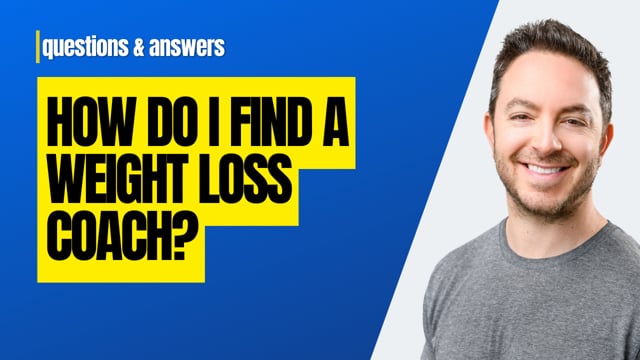
How Do I Find a Weight Loss Coach?
You can find a weight-loss coach locally or online. Both options have pros and cons, so to decide which one is best for you, you should consider convenience, ease of access, and what kind of communication you prefer.
Finding a coach can be as simple as searching for "weight loss coach online" or "weight loss coach near me" in Google. Another common way to find a coach is to ask around. If you know someone who has lost weight and is happy with their coach, ask them for a recommendation. You can also post on social media or in local forums.
There are many ways to find someone to help, but the first step is deciding whether you want someone local or online. Both options have pros and cons, so I'll list some of each so that you can make an informed decision.
First, let's look at the pros and cons of hiring a local weight loss coach:
The best thing about hiring a coach close to where you live is that you can meet with them in person. When you work with someone face-to-face, they can read your body language and facial expressions and change their feedback based on what they see.
If you work with a remote coach over text or email, you miss out on visual cues. But that doesn't mean a local coach is more effective. Talking on the phone or through a video chat with someone online can be just as helpful as meeting in person.
A local coach is also close to where you live and work, so they can recommend restaurants, gyms, and things to do in your area.
Strangely enough, the reasons why hiring a local coach is a good idea are the same reasons it might not be a good idea. For one, if you want to meet with your coach in person, you have to go to their office. The problem is that many people find it hard to get time off work or travel to see their coach. They simply don't have time to fit an in-person meeting into their already busy schedule.
But the biggest problem I've seen with hiring a local coach is that you can only meet with them a few times a month. Working with your coach once a week, or even worse, once a month, isn't enough to work through the daily problems that keep you from sticking to your plan.
Now, let's look at some of the pros and cons of working with an online coach.
The best part about hiring a remote coach is you don't have to take time off work or travel to see them. You can text, email, or use video chat to talk to them whenever it works best for you. You can also work with your coach from anywhere in the world, like at home, at your in-laws', or even at the beach. If you need help, they will be there for you any time of day or night.
You also have a better chance of finding the right coach if you work with an online coach. If you struggle with emotional eating, you'll probably want a coach who has been in your shoes. The same is true if you are a single parent trying to find time for yourself or a business owner dealing with the stress of running a business. It can be hard to find a coach near you who understands your situation, but many online coaches do.
Since MyBodyTutor is an online coaching business, we are obviously biased because we know how convenient it is for our clients. But that doesn't mean that an online coach is right for everyone. A lot of people would rather work with their coach in person and are willing to give up the convenience and easy access that a remote coach would give them. And that's fine too!
There is no right or wrong answer, and there is no one best way for everyone. The only thing that matters is that you think about your options and choose the type of coach who will help you stay on track and reach your goals.
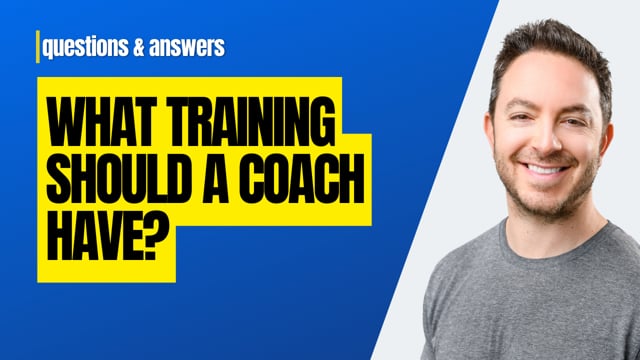
What Training or Certifications Should a Weight Loss Coach Have?
Weight-loss coaches are not required by any governing body to hold a particular certification or degree. If a coach is certified by a reputable organization, that is usually a good sign, but there are no legal requirements, such as a license, that must be met.
If you want to hire someone to help you lose weight, you might be curious about what credentials to look for. So, what kind of training or certifications should a weight loss coach have?
I'm so glad you asked!
I think it's good to have some kind of certification that shows you've gone through a program. A degree or certification shows that you have some knowledge and experience in the field. But not all coaching certifications are created equal, and just because a coach has a degree in exercise science or nutrition doesn't mean they can help you reach your goals.
I've seen a lot of coaches with impressive resumes who just don't have the skills to help their clients. So, before you hire someone, you need to do your homework. And I recommend that you pay more attention to the coach's experience and how well they do their job rather than on their credentials.
The best way to figure out if a coach has what it takes to help you is to look at their past successes. Also, ask them what they will do to help you get results and how they will help you along the way.
So what does this mean for you?
Certifications are a good way to show that you know what you're talking about. But a certification is just a piece of paper that says, "I can do this." It doesn't say anything about how good they are at doing it. Instead, look for a track record of success with people who have similar goals to yours.
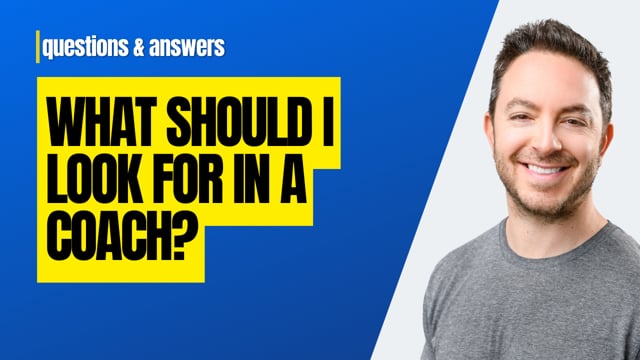
What Should I Look for in a Weight Loss Coach?
When looking for a weight loss coach, it's important to find someone who has had success with clients in the past, who understands your situation and can relate to it, and who can help you come up with a plan that fits your needs.
There are a lot of coaches out there, and it can be hard to find the right one. So, it's best to have a few criteria in mind so you can start narrowing down your choices and find the best one for you.
Finding a coach can be a lot like looking for a partner. The more you know about what you want, the easier it will be to find someone who fits your personality and needs. And while there are a lot of things to consider when picking the right coach, here are the most important ones:
First, you should look for someone who fits your budget. Quality coaching doesn't come cheap, but it doesn't have to be too expensive either. There are a lot of coaches out there whose prices won't break the bank.
Next, find out if the coach has any testimonials from people who have lost weight and kept it off. Also, look for reviews from people who have used the program and had success with it. If they don't have any success stories or positive reviews, it's best to look somewhere else.
You'll also want to determine if the coach seems like someone who would be a good fit. If you feel like they could really understand what you're going through and connect with you on a personal level, that's a good sign.
Finally, it's important to know if they use a one-size-fits-all approach or if they customize the program to your needs. Everyone is different, so if they use a cookie-cutter approach, it's a red flag. A good weight loss coach will take the time to make a plan that's tailor-made for you.
If all these things check out, you can move on to the next step and call them. I suggest talking to the coach on the phone. You'll want to tell them a little about yourself and your situation. As you talk, you'll learn more about this person's coaching style and be able to decide if it's what you're looking for.
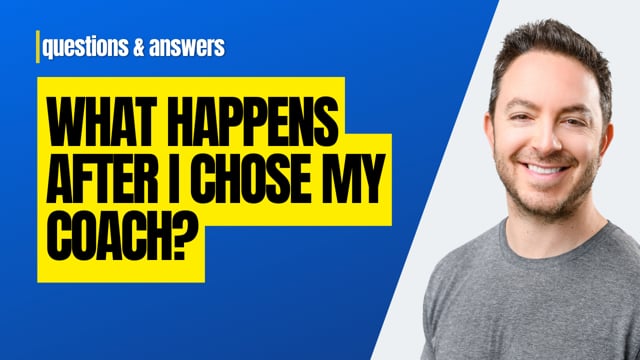
What Happens After I Have Chosen My Coach?
Now that you've picked a coach, you're probably wondering what happens next.
First, you'll schedule a call so they can get to know you better. This is where they will ask about what you like and don't like and which changes you're willing to make and which you aren't. They'll likely have you fill out some initial assessments and take some measurements, such as how much you weigh.
After that, they'll start creating a nutrition and exercise plan and recommend and habits that will help you reach your goals.
Remember that your coach's goal is to make sure you have a plan that is reasonable, realistic, and doable. Above all, they want you to have a plan that you're excited about and know you can stick to, so if you have any doubts that you'll be able to follow the plan, it's important to let them know!
Next, your coach will help you set up any tools that will help you talk to each other and keep track of your progress. You might use an app or a diary to keep track of what and how much activity/exercise you did.
You should also expect to have regular check-ins with your coach. They will want to know how things are going, if you are sticking to the plan, and if anything needs to be changed.
Now, I can't stress this part enough:
If there's one thing that keeps people from being successful, it's that they don't want to talk about the things didn't go as planned. If you're having problems or setbacks, it's important to be honest with your coach so they can help you get through them.
People often don't tell their coaches about their mistakes because they are embarrassed or think that their coach will think less of them if they do. But this is when you need to have faith in your coach. If you make a mistake, your coach won't think less of you. The truth is that your coach is human too and we all make mistakes. The important thing is to learn from our setbacks so we don't repeat them over and over again.
So, if you want to be successful and reach your goals, be honest with yourself and your coach.
If something isn't working, let them know.
If you're feeling frustrated, let them know.
If you're feeling stuck, let them know.
If you're feeling embarrassed about something that happened, let them know.
Your coach is there to help you with anything that gets in the way, so don't be afraid to tell them what's going on. They will give you the tools and support you need to deal with any problem or obstacle that comes your way.
Conclusion
Now that you know all about how to find the right weight-loss coach, you can focus on all the great things that await you!
And if you still have questions about how to find the right coach for you, feel free to get in touch with us. We want to help! You can email me directly at adam@mybodytutor.com or schedule a free call with me at this link.